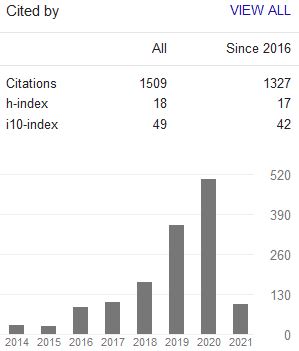ISLAM, LOCAL “STRONGMEN”, AND MULTI-TRACK DIPLOMACIES IN BUILDING RELIGIOUS HARMONY IN PAPUA
Abstract
Keywords
Full Text:
PDFReferences
“Demonstrasi Pekerja Freeport” https://economy.okezone.com/ read/2018/08/17/320/1937942/demo-eks-pekerja-freeport-bagaimana-kisah-sebenarnya (accessed on 2 December 2018)
“Indeks Kerukunan Umat Beragama di Papua Barat” http://-www.satu¬harapan.com/read-detail/read/indeks-kerukunan-umat¬-¬beragama-di-papua-barat-7284-persen (accessed on 26 March 2018).
“Papua menolak FPI dan HTI” https://www.papua.go.id/view-detail-berita-4426/papua-tolak-fpi-dan-hti.html accessed on 23 March 2018
“Pembakaran Masjid di Papua” https://www.republika.co.id/berita/ nasional/hukum/15/07/17/nrmprs-ini-kronologis-pembakaran-masjid-di-tolikara (accessed on 18 April 2018)
“Penangkapan Tokoh Gerakan Papua Merdeka” https:// www.bbc.com/indonesia/indonesia-46454974 (accessed on 2 December 2018)
“Penolakan terhadap Kelompok Umar di Papua” https:// www.youtube.com/watch?v=Wm6aTIQCO40 (accessed on 18 April 2018)
“Zona Kerukunan Beragama Kini Ada di Jayapura” https:// nasional.tempo.co/read/770572/jayapura-jadi-zona-integritas-kerukunan-beragama (accessed on 26 March 2018)
al Hamid, Idrus. “Political Identity, Culture of Religious Plurality, and Implication in interaction of Jayapura Partnership.” International Journal of Management and Administrative Sciences, 5, 10 (2018), pp. 18-29.
As’ad, Muh. “Kehidupan Keagamaan dan Budaya Masyarakat di Kota Jayapura Provinsi Papua.” Jurnal al-Qalam, 20, 2 (2007), pp. 85-98.
Bahar, M. Saeful. “Pola Interaksi Kyai-Bejingan dalam Pembangunan Demokrasi di Indonesia: Studi terhadap local-strongman dalam Pilkades di Kabupaten Bondowoso Jawa Timur”. Unpublished Dissertation, Airlangga University, Surabaya, 2017.
Cader, Akram Abdul. “Islamic Principles of Conflict Management: A Model for Human Resource Management.” International Journal of Cross Cultural Management, 17, 3 (2017), pp. 345-363.
Data of Papua BPS Office at 2016 https://papua. bps.go.id/ accessed on 26 March 2018.
Galloway, Brooke Patricia. “Perceptions of Peacebuilding and Multi-Track Collaboration in Divided Societies for a Sustainable Peace Agreement at the Political Level: A Case Study of Cyprus.” Unpublished Dissertation, Portland State University, 2011.
Harriss, J., K Stoke and Olle Tomquist (eds). Politicizing Democracy: The New Local Politics of Democratization. London: Springer, 2004.
Hermawan, J. Budi. Gereja-Gereja di Papua; Menjadi Nabi di Tanah Sendiri. Jayapura: Sekretariat Keadilan dan Perdamaian Keuskupan Jayapura, 2002.
Kantor Kementerian Wilayah Agama Provinsi Papua, Majalah Damai; Jembatan Hati Nurani Umat, 16 (2017).
Marshall, A. J. and Bruce B. Beehler. The Ecology of Papua. Sydney: Periplus Edition Ltd, 2007.
McDonald, John W. “The Institute for Multi-Track Diplomacy.” Journal of Conflictology, 3, 2 (2012), pp. 66-70.
Mu’ti, A. and Najib Burhani. “The Limits of Religious Freedom in Indonesia; With Reference to the First Pillar Ketuhanan Yang Maha Esa of Pancasila.” Indonesian Journal of Islam and Moslem Societies, 9, 1 (2019), pp. 111-134.
Nuruddin, Sabara. “Kiprah Setengah Abad Yayasan Pendidikan Islam (Yapis) Papua; Membangun Harmoni Beragama melalui Dunia Pendidikan.” al-Qalam, 24, 1 (2018), pp. 65-72.
Pamungkas, Cahyo. “The Contestation of Muslim and Special Autonomy in Papua.” Religio: Jurnal Studi Agama-Agama, 5, 1 (2015), pp. 26-49.
Ramburu, Musa, Suwardono, Hasse J and Ridho al Hamdi. “The Construction of Muslim Identity Post Special Autonomy: The Study of Majelis Muslim Papua Existence.” Epistemé: Jurnal Pengembangan Ilmu Keislaman, 13, 2 (2018), pp. 339-360.
Sidel, John T. “Bossism and Democracy in the Philippine, Thailand, and Indonesia; Towards an Alternative Framework for Study of Local Strongman.” J. Harriss, K Stoke and Olle Tomquist (eds). Politicizing Democracy: The New Local Politics of Democratization. London: Springer, 2004.
Viartasiwi, Nino. “Holding on a Thin Rope: Muslim Papuan Communities as the Agent of Peace in Papua Conflict.” Procedia Environmental Sciences, 17 (2013), pp. 860-869.
Waimbo, Denny Eris and Prapto Utomo, Dinamika Masyarakat Papua pada Era Otonomi Khusus. Jayapura: Universitas Cendrawasih Press, 2011.
DOI: 10.15642/JIIS.2020.14.1.113-138
Refbacks
- There are currently no refbacks.
Indexed by:
Journal of Indonesian Islam (ISSN 1978-6301 and E-ISSN 2355-6994) is published by the Postgraduate Program (PPs) and the Institute for the Study of Religion and Society (LSAS), State Islamic University (UIN) of Sunan Ampel Surabaya.
Journal of Indonesian Islam by http://jiis.uinsby.ac.id/index.php/JIIs/index is licensed under a Creative Commons Attribution-ShareAlike 4.0 International License.
Copyright ©2020 State Islamic University (UIN) of Sunan Ampel Surabaya. Powered by Public Knowledge Project OJS.







